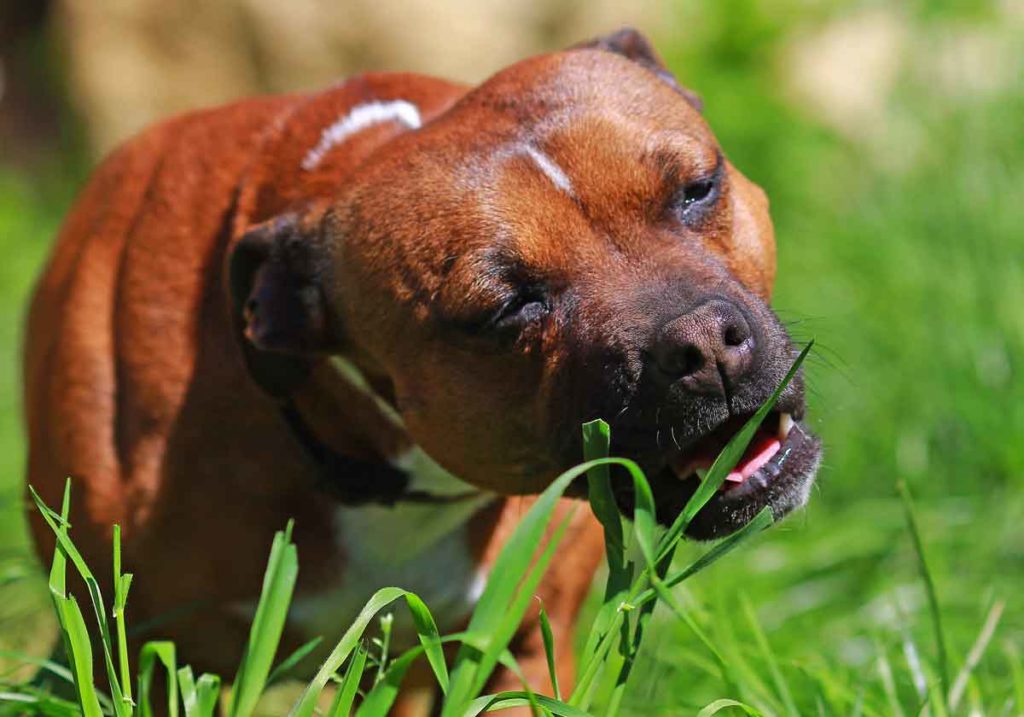Table of contents
If your canine companion is holding up your daily walks to snack on grass along the way, you are not alone. Dog parents far and wide report that their dogs regularly eat grass. They’re well-fed at home, so why are they nibbling on the neighbor’s lawn?
While it can be frustrating and concerning for your dog to be eating something not typically considered food, this behavior is not always cause for alarm. There are a number of possible reasons behind your pup’s grass-eating. In most cases, however, it’s just normal canine behavior and not likely something to worry about.
Soothing an upset tummy
A common assumption among pet owners is that dogs eat grass to relieve upset stomachs. Grass is thought to induce vomiting. However, studies show that fewer dogs vomit after eating grass than this theory would suggest. While it’s entirely possible that your dog may throw up after consuming grass, the notion that they deliberately do it to self-soothe a tummy ache is most likely just a myth.
Filling nutrient gaps
One possible explanation for your dog’s grass-eating tendencies is that they’re craving something to address a nutrient deficiency. We all feel better when our digestive systems are operating efficiently, and dogs are no different. Your dog may be stopping mid-walk for a grass snack as a way to add some fiber to their diet. Grazing may be filling a digestive need. Roughage in a dog’s diet helps their bodily functions run more smoothly.
Got it from their ancestors
It’s important to remember that our lovable pups are descendants of wolves. In the wild, these animals balanced their diets by eating what they hunted and scavenged for—including the stomach contents of their prey. Eating an entire animal typically means also eating the grass and other green plants that their food had already eaten, fulfilling the dog’s natural need for fiber.
While eating grass can be a way for your dog to fill nutrient gaps, this might also be an evolutionary behavior they’ve retained from their wild ancestors. Your dog has a natural instinct to scavenge for their food. Nibbling on grass gives them an opportunity to both scavenge and more closely match the diet of their ancient relatives.
Your “yuck” is their “yum”
Dog parents know firsthand that pups, especially young dogs, explore the world around them with their mouths. There may be nothing more behind your dog’s grass-eating habit than the fact that they simply like the taste and or texture. You may even notice that your dog is a picky grass eater. Are they selective about the type of grass they want to eat? One lawn may be better than another depending on your dog’s individual tastes. In this case, call your canine companion a grass connoisseur.
What to look out for
Pup parents can find some comfort in knowing that grass eating is both incredibly common and usually harmless for your furry friend. There are, however, a few things to keep in mind and look out for when your dog is searching for a backyard snack.
It’s reasonable to assume that some of the best-looking lawns are sprayed or otherwise treated with herbicides and or pesticides to keep them looking that good. Dog owners should be mindful of this, as these chemicals can be toxic for dogs. Additionally, grassy areas that get a high volume of canine traffic may be contaminated with intestinal parasites. Grass can be home to hookworms or roundworms from the fecal residue of other dogs. If possible, discourage your pup from grazing in these areas. If your dog is exhibiting any unusual behavior such as vomiting, diarrhea, or changes in their grass-eating habits, be sure to consult your veterinarian.









